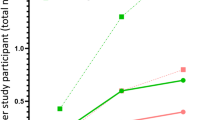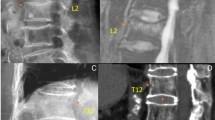Abstract
Summary
Based on an evaluation of vertebral fracture prevalence on lateral radiographs across all age groups in a large cohort, mild or wedge-shaped vertebral body changes identified among adults should be managed as osteoporosis or at least considered as a risk factor for osteoporotic fracture, since they are rare among young subjects.
Introduction
Radiographic assessment of vertebral fractures is limited by the inability to distinguish mild fractures from congenital mild wedge deformities or vertebrae of short vertebral height. We attempted to quantify the expected background prevalence of these deformities by measuring vertebral fracture prevalence across all age groups in a large hospital-based retrospective Chinese cohort.
Methods
We reviewed eligible lateral chest radiographs from patients admitted to Peking Union Medical College Hospital during 2011 using the Genant semiquantitative method for vertebral fracture assessment (T4–L2). We evaluated fracture prevalence among subjects by sex, 10-year age group, and fracture severity grades subjectively. We further analyzed characteristics of subjects with mild (grade I) fractures to estimate the relative contribution of congenital mild wedge deformities.
Results
A total of 10,720 subjects (5,396 men and 5,324 women) with lateral chest radiographs were evaluated. Subjects ranged in age from 0.5 to 97 years with a mean of 51.8 ± 17.4 years (men 52.8 ± 17.6 years; women 50.8 ± 17.2 years). When stratified by 10-year age groups, the prevalence of vertebral fractures was relatively low until about 40 years of age, after which prevalence increased for both genders. Fractures (13 fractures for 9 males and 6 fractures for 5 females) seen in subjects younger than 40 years of age were almost exclusively mild grade fractures. No fractures were identified in subjects younger than 20 years of age.
Conclusions
Mild or wedge-shaped vertebral body changes on lateral radiographs are rare among young subjects, indicating that when mild vertebral deformities are found among adults, they are likely to be the product of aging and not congenital variation. Clinically, therefore, mild vertebral body changes should be managed as osteoporosis or at least considered as a risk factor for osteoporotic fracture.



Similar content being viewed by others
References
Alhava EM (1991) Bone density measurements. Calcif Tissue Int 49(Suppl):S21–S23
Campion JM, Maricic MJ (2003) Osteoporosis in men. Am Fam Physician 67:1521–1526
Johnell O, Kanis JA (2006) An estimate of the worldwide prevalence and disability associated with osteoporotic fractures. Osteoporos Int 17:1726–1733
Kanis JA, Melton LJ 3rd, Christiansen C, Johnston CC, Khaltaev N (1994) The diagnosis of osteoporosis. J Bone Miner Res 9:1137–1141
Genant HK, Wu CY, van Kuijk C, Nevitt MC (1993) Vertebral fracture assessment using a semiquantitative technique. J Bone Miner Res 8:1137–1148
Jiang G, Eastell R, Barrington NA, Ferrar L (2004) Comparison of methods for the visual identification of prevalent vertebral fracture in osteoporosis. Osteoporos Int 15:887–896
Link TM, Guglielmi G, van Kuijk C, Adams JE (2005) Radiologic assessment of osteoporotic vertebral fractures: diagnostic and prognostic implications. Eur Radiol 15:1521–1532
Guglielmi G, Diacinti D, van Kuijk C, Aparisi F, Krestan C, Adams JE, Link TM (2008) Vertebral morphometry: current methods and recent advances. Eur Radiol 18:1484–1496
O’Neill TW, Felsenberg D, Varlow J, Cooper C, Kanis JA, Silman AJ (1996) The prevalence of vertebral deformity in european men and women: the European Vertebral Osteoporosis Study. J Bone Miner Res 11:1010–1018
Delmas PD, van de Langerijt L, Watts NB, Eastell R, Genant H, Grauer A, Cahall DL (2005) Underdiagnosis of vertebral fractures is a worldwide problem: the IMPACT study. J Bone Miner Res 20:557–563
Davis JW, Ross PD, Wasnich RD, MacLean CJ, Vogel JM (1989) Comparison of cross-sectional and longitudinal measurements of age-related change in bone mass. J Bone Miner Res 4:351–357
Davis JW, Ross PD, Vogel JM, Wasnich RD (1991) Age-related changes in bone mass among Janpanese-American men. Bone Miner 15:227–236
Melton LJI, Kan SH, Frye MA, Wahner HW, O’Fallon WM, Riggs BL (1989) Epidemiology of vertebral fractures in women. Am J Epidemiol 129:1000–1011
Ferrar L, Jiang G, Armbrecht G, Reid DM, Roux C, Gluer CC, Felsenberg D, Eastell R (2007) Is short vertebral height always an osteoporotic fracture? The Osteoporosis and Ultrasound Study (OPUS). Bone 41:5–12
Oei L, Rivadeneira F, Ly F, Breda SJ, Zillikens MC, Hofman A, Uitterlinden AG, Krestin GP, Oei EH (2013) Review of radiological scoring methods of osteoporotic vertebral fractures for clinical and research settings. Eur Radiol 23:476–486
Ferrar L, Jiang G, Adams J, Eastell R (2005) Identification of vertebral fractures: an update. Osteoporos Int 16:717–728
Spector TD, McCloskey EV, Doyle DV, Kanis JA (1993) Prevalence of vertebral fracture in women and the relationship with bone density and symptoms: the Chingford Study. J Bone Miner Res 8:817–822
Kleerekoper M, Nelson DA (1992) Vertebral fracture or vertebral deformity. Calcif Tissue Int 50:5–6
Garton MJ, Robertson EM, Gilbert FJ, Gomersall L, Reid DM (1994) Can radiologists detect osteopenia on plain radiographs? Clin Radiol 49:118–122
Podenphant J, Nielsen VA, Riis BJ, Gotfredsen A, Christiansen C (1987) Bone mass, bone structure and vertebral fractures in osteoporotic patients. Bone 8:127–130
Heuck AF, Block J, Glueer CC, Steiger P, Genant HK (1989) Mild versus definite osteoporosis: comparison of bone densitometry techniques using different statistical models. J Bone Miner Res 4:891–900
Ettinger B, Black DM, Nevitt MC, Rundle AC, Cauley JA, Cummings SR, Genant HK (1992) Contribution of vertebral deformities to chronic back pain and disability. The Study of Osteoporotic Fractures Research Group. J Bone Miner Res 7:449–456
Melton LJ, Lane AW, Cooper C, Eastell R, O’Fallon WM, Riggs BL (1993) Prevalence and incidence of vertebral deformities. Osteoporos Int 3:113–119
Leidig-Bruckner G, Limberg B, Felsenberg D, Bruckner T, Holder S, Kather A, Miksch J, Wuster C, Ziegler R, Scheidt-Nave C (2000) Sex difference in the validity of vertebral deformities as an index of prevalent vertebral osteoporotic fractures: a population survey of older men and women. Osteoporos Int 11:102–119
Abdel-Hamid Osman A, Bassiouni H, Koutri R, Nijs J, Geusens P, Dequeker J (1994) Aging of the thoracic spine: distinction between wedging in osteoarthritis and fracture in osteoporosis—a cross-sectional and longitudinal study. Bone 15:437–442
Dequeker J, Burssens A, Creytens G, Bouillon R (1975) Ageing of bone: its relation to osteoporosis and osteoarthrosis in post-menopausal women. Front Horm Res 3:116–130
Yu W, Gluer CC, Grampp S, Jergas M, Fuerst T, Wu CY, Lu Y, Fan B, Genant HK (1995) Spinal bone mineral assessment in postmenopausal women: a comparison between dual X-ray absorptiometry and quantitative computed tomography. Osteoporos Int 5:433–439
Pacifici R, Rupich R, Griffin M, Chines A, Susman N, Avioli LV (1990) Dual energy radiography versus quantitative computer tomography for the diagnosis of osteoporosis. J Clin Endocrinol Metab 70:705–710
Guglielmi G, Grimston SK, Fischer KC, Pacifici R (1994) Osteoporosis: diagnosis with lateral and posteroanterior dual x-ray absorptiometry compared with quantitative CT. Radiology 192:845–850
Gehlbach SH, Bigelow C, Heimisdottir M, May S, Walker M, Kirkwood JR (2000) Recognition of vertebral fracture in a clinical setting. Osteoporos Int 11:577–582
Conflicts of interest
Wei Yu, Qiang Lin, Xiaohong Zhou, Hongyu Shao, and Pengtao Sun declare that they have no conflict of interest.
Author information
Authors and Affiliations
Corresponding author
Rights and permissions
About this article
Cite this article
Yu, W., Lin, Q., Zhou, X. et al. Reconsideration of the relevance of mild wedge or short vertebral height deformities across a broad age distribution. Osteoporos Int 25, 2609–2615 (2014). https://doi.org/10.1007/s00198-014-2801-7
Received:
Accepted:
Published:
Issue Date:
DOI: https://doi.org/10.1007/s00198-014-2801-7




